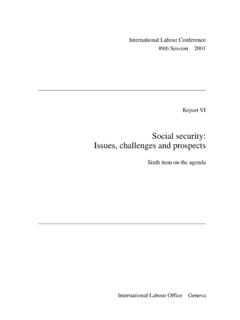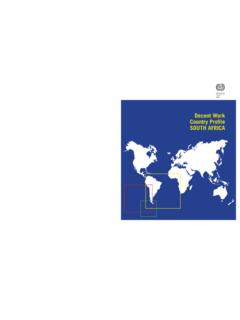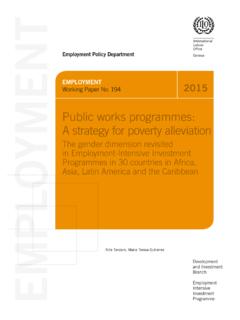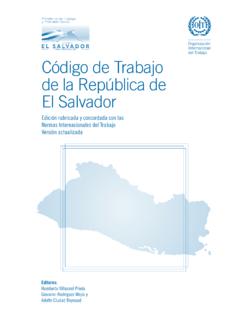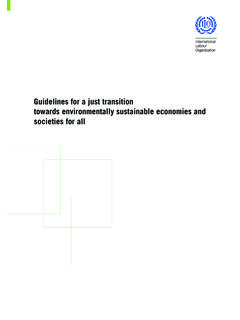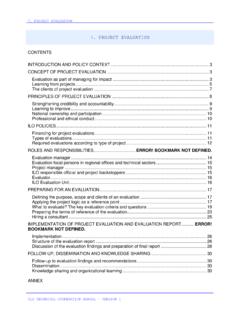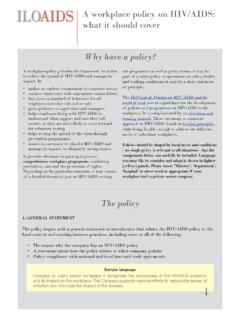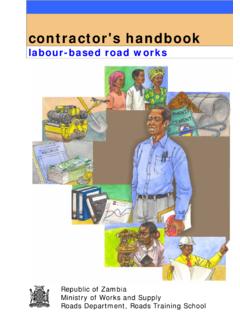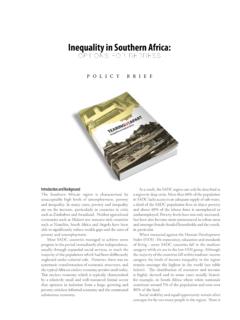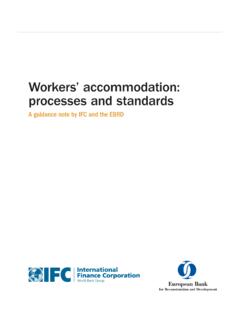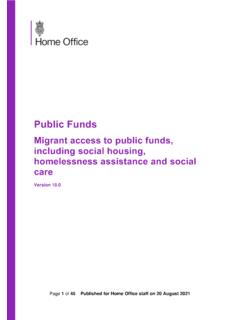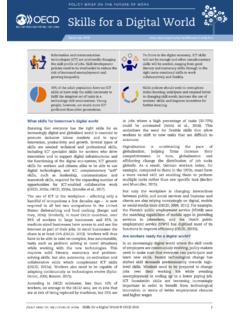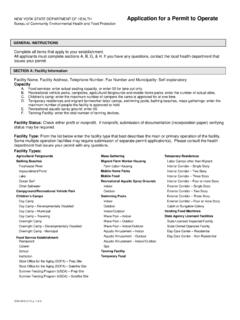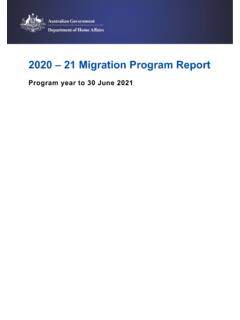Transcription of General principles and operational guidelines for fair ...
1 General principles and operationalguidelines for fair recruitmentandDefinition of recruitment feesand related costs ILOG eneral principles and operationalguidelines for fair recruitmentandDefinition of recruitment feesand related costsInternational Labour Office, GenevaCopyright International Labour Organization 2019 First published 2019 Publications of the International Labour Office enjoy copyright under Protocol 2 of the Universal Copyright Convention. Nevertheless, short excerpts from them may be reproduced without authorization, on condition that the source is indicated. For rights of reproduction or translation, application should be made to ILO Publications (Rights and Licensing), International Labour Office, CH-1211 Geneva 22, Switzerland, or by email: The International Labour Office welcomes such , institutions and other users registered with a reproduction rights organization may make copies in accordance with the licences issued to them for this purpose.
2 Visit to find the reproduction rights organization in your principles and operational guidelines for fair recruitment & Definition of recruitment fees and related costs. International Labour Office - Fundamental principles and Rights at Work Branch, Labour Migration Branch Geneva: ILO, 2019 ISBN 978-92-2-133354-8 (print) ISBN 978-92-2-133333-3 (web pdf) Also available in French: ISBN 978-92-2-133415-6 (print), 978-92-2-133416-3 (web pdf); in Spanish: ISBN 978-92-2-133417-0 (print), 978-92-2-133418-7 (web pdf); and in Arabic: ISBN 978-92-2-133457-6 (print), 978-92-2-133458-3 (web pdf).The designations employed in ILO publications, which are in conformity with United Nations practice, and the presentation of material therein do not imply the expression of any opinion whatsoever on the part of the International Labour Office concerning the legal status of any country, area or territory or of its authorities, or concerning the delimitation of its responsibility for opinions expressed in signed articles, studies and other contributions rests solely with their authors, and publication does not constitute an endorsement by the International Labour Office of the opinions expressed in them.
3 Reference to names of firms and commercial products and processes does not imply their endorsement by the International Labour Office, and any failure to mention a particular firm, commercial product or process is not a sign of on ILO publications and digital products can be found at: Cover photo copyright ILOP rinted in SwitzerlandPhotocomposed by Dina Alwani, Beirut, I General principles and operational guidelines for fair recruitmentPart 2 Definition of recruitment fees and related costsAppendix Main sources for the General principles and operational guidelines for fair recruitment7 25 3156 Arthur AncionPart I General principles and operational guidelines for fair recruitment78 ILO/Alfredo C lizAbbreviationsInternational labour standards(a) Conventions and ProtocolC29 Forced Labour Convention, 1930 (No.)
4 29)C81 Labour Inspection Convention, 1947 (No. 81)C87 Freedom of Association and Protection of the Right to Organise Convention, 1948 (No. 87)C88 Employment Service Convention, 1948 (No. 88)C94 Labour Clauses (Public Contracts) Convention, 1949 (No. 94)C97 Migration for Employment Convention (Revised), 1949 (No. 97)C98 Right to Organise and Collective Bargaining Convention, 1949 (No. 98)C100 Equal Remuneration Convention, 1951 (No. 100)C105 Abolition of Forced Labour Convention, 1957 (No. 105)C111 Discrimination (Employment and Occupation) Convention, 1958 (No. 111)C129 Labour Inspection (Agriculture) Convention, 1969 (No. 129)C138 Minimum Age Convention, 1973 (No.
5 138)C143 migrant workers (Supplementary Provisions) Convention, 1975 (No. 143)C150 Labour Administration Convention, 1978 (No. 150)C181 Private Employment Agencies Convention, 1997 (No. 181)C182 Worst Forms of Child Labour Convention, 1999 (No. 182)C189 Domestic Workers Convention, 2011 (No. 189)MLC, 2006 Maritime Labour Convention, 2006P29 Protocol of 2014 to the Forced Labour Convention, 1930 (No. 29)(b) RecommendationsR83 Employment Service Recommendation, 1948 (No. 83) R86 Migration for Employment Recommendation (Revised), 1949 (No. 86)R151 migrant workers Recommendation, 1975 (No. 151)R157 Nursing Personnel Recommendation, 1977 (No. 157)R169 Employment Policy (Supplementary Provisions) Recommendation, 1984 (No.
6 169)R188 Private Employment Agencies Recommendation, 1997 (No. 188)R201 Domestic Workers Recommendation, 2011R203 Forced Labour (Supplementary Measures) Recommendation, 2014 (No. 203)R204 Transition from the Informal to the Formal Economy Recommendation, 2015 (No. 204)International Labour Organization DeclarationILO MNE Declara-tionTripartite Declaration of principles concerning Multinational Enterprises and Social Policy, 1977 (as amended)9 ICERDI nternational Convention on the Elimination of All Forms of Racial Discrimination, 1965 ICCPRI nternational Covenant on Civil and Political Rights, 1966 ICESCRI nternational Covenant on Economic, Social and Cultural Rights, 1966 Other sourcesCIETT*International Confederation of Private Employment Agencies (CIETT)
7 Code of Conduct, 2015 Dhaka PrinciplesThe Dhaka principles for Migration with Dignity, 2012 IRIS CodeInternational Organization for Migration, International Recruitment Integrity System Code of ConductUN Guiding PrinciplesUnited Nations Guiding principles on Business and Human Rights, 2011 Verit Code of ConductVerit Fair Hiring Toolkit, Sample Code of Conduct Provisions* As of 21 September 2016, CIETT has been rebranded as The World Employment ILOG eneral principles and operational guidelines for fair recruitment 1I. Scope of the General principles and operational guidelinesThe objective of these non-binding ILO General principles and operational guidelines for fair recruitment (hereafter principles and guidelines ) is to inform the current and future work of the ILO and of other organizations, national legislatures, and the social partners on promoting and ensuring fair principles and guidelines are derived from a number of sources.
8 The primary sources are international labour standards and related ILO instruments. Other sources and good practices have also been consulted. All the sources are listed in the appendix to this principles and guidelines are intended to cover the recruitment of all workers, including migrant workers , whether directly by employers or through intermediaries. They apply to recruitment within or across national borders, as well as to recruitment through temporary work agencies, and cover all sectors of the economy. Implementation of these principles and guidelines at the national level should occur after consultation between the social partners and the distinction is drawn between General principles which are intended to orient implementation at all levels and operational guidelines which address responsibilities of specific actors in the recruitment process and include possible interventions and policy Definitions and terms For the purposes of these principles and guidelines .
9 The term due diligence refers to an enterprise s ongoing process which aims to identify, prevent, mitigate, and account for how it addresses the adverse human rights impacts of its own activities or which may be directly linked to its operations, products 1 The Governing Body of the International Labour Organization, meeting at its 328th Session (Geneva, 26 Octo-ber 9 November 2016), authorized the Director- General to publish and disseminate the General principles and operational guidelines for Fair Recruitment adopted by the Meeting of Experts on Fair Recruitment (Geneva, 5-7 September 2016).11or services by its business relationships.
10 The process should include assessing actual and potential human rights impacts, integrating and acting upon the findings, tracking responses, and communicating how impacts are addressed; the term employer refers to a person or an entity that engages employees or workers, either directly or indirectly; the term enterprise refers to employers, labour recruiters other than public employment services, and other service providers involved in the recruitment process; the term labour recruiter refers to both public employment services and to private employment agencies and all other intermediaries or subagents that offer labour recruitment and placement services.
